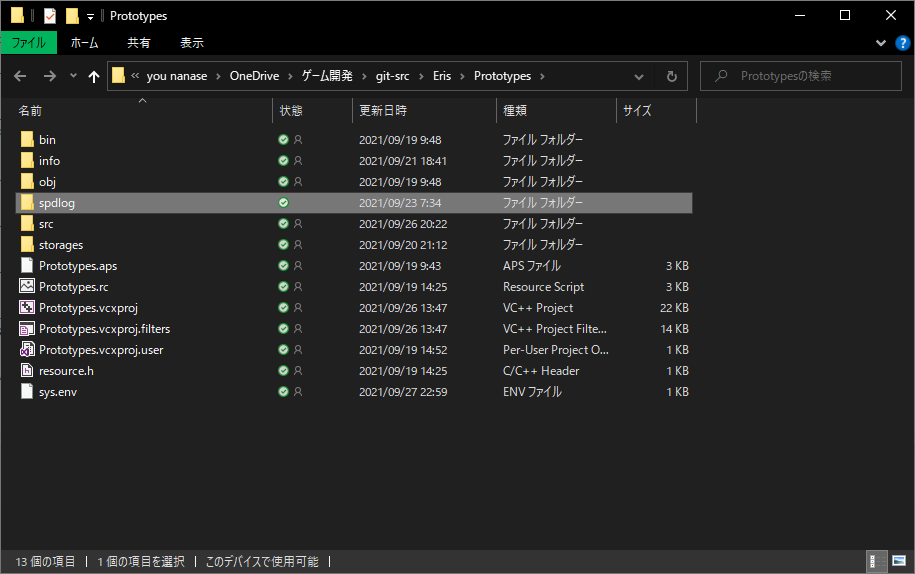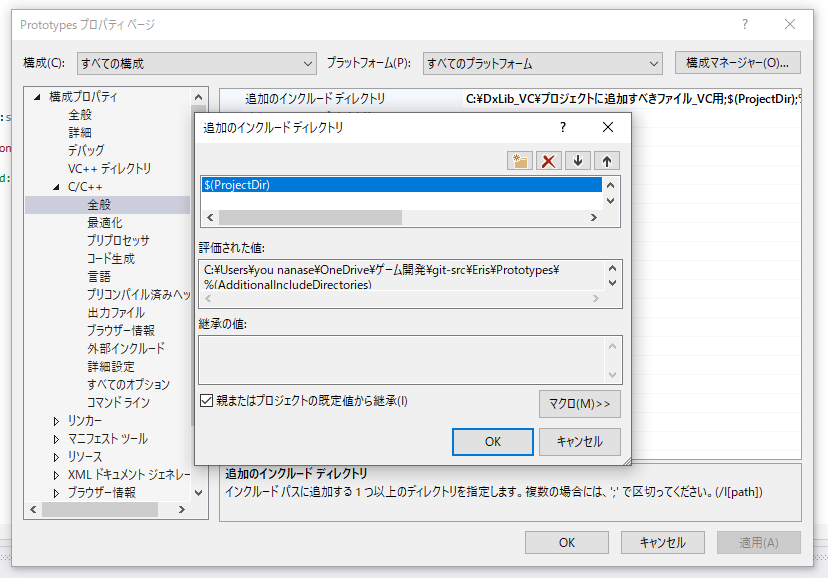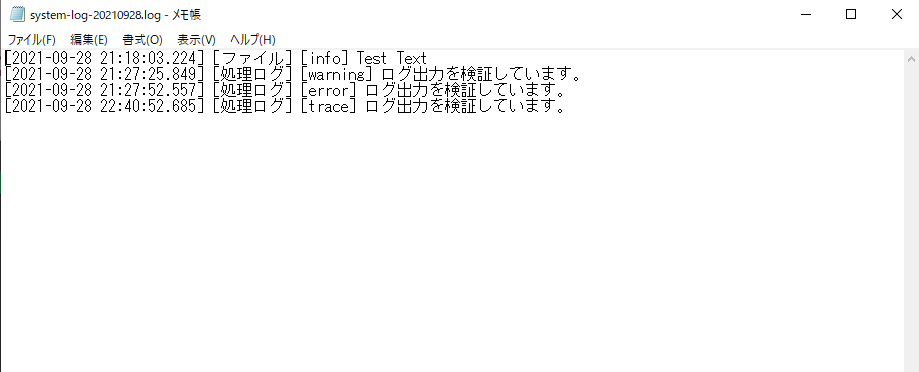ゲーム開発で必要?と思われるであろう、ログ出力をしています。
C++の場合はとにかく早いライブラリが需要高で、案の定spdlog。
作者はイスラエルの方みたいです。
// spdlog_inc.cpp
// includes.
#include <sstream>
#include <string>
#include <spdlog/spdlog.h>
#include <spdlog/sinks/basic_file_sink.h>
#include "src/forms/trace/log_classification.hpp"
namespace forms {
namespace trace {
namespace writer {
void writeGenericLogData(std::string filename, std::string title, std::string body, LogClassification type) {
try {
auto i_logger = spdlog::basic_logger_mt(title, filename);
switch (type) {
case LogClassification::LOG_LEVEL_INFO:
i_logger->info(body);
break;
case LogClassification::LOG_LEVEL_TRACE:
spdlog::set_level(spdlog::level::trace);
i_logger->trace(body);
break;
case LogClassification::LOG_LEVEL_DEBUG:
i_logger->debug(body);
break;
case LogClassification::LOG_LEVEL_WARN:
i_logger->warn(body);
break;
case LogClassification::LOG_LEVEL_ERROR:
i_logger->error(body);
break;
case LogClassification::LOG_LEVEL_CRITICAL:
i_logger->critical(body);
break;
default:
i_logger->log(spdlog::level::off, body);
break;
}
spdlog::drop_all();
}
catch (const spdlog::spdlog_ex& ex) {
std::stringstream ss;
ss << "Log init failure: " << ex.what() << std::string("\0");
std::string exstr = ss.str();
MessageBox(NULL, exstr.c_str(), "spdlog Exception info", MB_OK);
}
} // void writeGenericLogData(std::string filename, std::string title, std::string body, LogClassification type) func end
} // namespace writer
} // namespace trace
} // namespace forms
spdlogライブラリをGitHubの作者ぺージ (https://github.com/gabime/spdlog) から入手して、該当のプロジェクトフォルダに追加。

Visual Studioの場合(しか分からないが…)は、対象プロジェクトのプロパティで「追加のインクルードディレクトリ」に「$(SolutionDir)」(もしくは $(ProjectDir)?)を設定すれば、使用できるようになる。

これはspdlog.h自体がspdlogのアペンディックスをシステムインクルードしている状態のために必要。
何なのかと言うと、山かっこでinclude している (#include <spdlog/spdlog.h>のように)。
spdlog自体がファイルロガーとして速度を重視しているためである。C言語におけるインクルードの引用符の仕組みについてはGoogle大先生に聞いてみてほしい。
ダブルクォートより、インクルードディレクトリを設定した上で山かっこincludeを行うと速度に影響がある(らしいよ( ^ω^))
実際に使用してみる。
// formal.hpp
#ifndef ERIS_FORMS_TRACE_DUPLICATE_FORMAL_HPP_
#define ERIS_FORMS_TRACE_DUPLICATE_FORMAL_HPP_
// includes.
#include <string>
#include "src/subroutine/kits/timecontroller/systime_script.hpp"
#include "src/forms/config/env.hpp"
#include "src/forms/trace/log_classification.hpp"
namespace {
const std::string defaultLogFilePath = "storages/dat/log/";
}
namespace forms {
namespace trace {
namespace duplicate {
class FormalDuplicate {
public:
FormalDuplicate();
~FormalDuplicate() = default;
bool doWriteLog(std::string text);
bool doWriteEditingStyleLog(std::string title, std::string body, LogClassification lvl);
private:
std::string outputLogFilePath;
std::string createLogFileName(std::string org_name);
};
inline FormalDuplicate::FormalDuplicate() {
std::string params = "";
// logfile name is 'system-log-[YYYYMMDD].log'.
if (!config::getParameter("$STREAM_OUTPUT_LOG_PATH", ¶ms)) params = defaultLogFilePath;
outputLogFilePath = createLogFileName(params);
}
inline std::string FormalDuplicate::createLogFileName(std::string org_name) {
std::string str;
if (!subr::kits::timecontroller::getCurrentDateTime(&str, "YYYYMMDD")) return "\0";
str = org_name + str.substr(0, 6) + "\\system-log-" + str + ".log"; // str.substr(0, 6) + "/" + is Monthly partition(Directory).
return str;
}
} // namespace duplicate
} // namespace trace
} // namespace forms
#endif // !ERIS_FORMS_TRACE_DUPLICATE_FORMAL_HPP_// formal.cpp
// includes.
#include "formal.hpp"
#include <string>
#include <Windows.h>
#include "src/forms/trace/writer/spdlogs_inc.hpp"
#include "src/forms/trace/log_classification.hpp"
namespace forms {
namespace trace {
namespace duplicate {
bool FormalDuplicate::doWriteLog(std::string text) {
writer::writeGenericLogData(outputLogFilePath, "Default log", text, LogClassification::LOG_LEVEL_INFO);
return true;
}
bool FormalDuplicate::doWriteEditingStyleLog(std::string title, std::string body, LogClassification lvl) {
writer::writeGenericLogData(outputLogFilePath, title, body, lvl);
return true;
}
} // namespace duplicate
} // namespace trace
} // namespace forms// log_classification.hpp
#ifndef ERIS_FORMS_TRACE_LOG_CLASSIFICATION_HPP_
#define ERIS_FORMS_TRACE_LOG_CLASSIFICATION_HPP_
namespace forms {
namespace trace {
enum class LogClassification {
LOG_LEVEL_OFF
, LOG_LEVEL_TRACE
, LOG_LEVEL_DEBUG
, LOG_LEVEL_INFO
, LOG_LEVEL_WARN
, LOG_LEVEL_ERROR
, LOG_LEVEL_CRITICAL
, LOG_LEVEL_UNKNOWN = 9
};
} // namespace trace
} // namespace forms
#endif // !ERIS_FORMS_TRACE_LOG_CLASSIFICATION_HPP_あの・・・説明省略で、、、全部ソース乗っけちゃう馬鹿者は私だああああああ?
// 使ってるcpp
#include <DxLib.h>
#include "src/forms/trace/duplicate/formal.hpp"
#include "src/forms/trace/log_classification.hpp"
#include "src/forms/trace/writer/spdlogs_inc.hpp"
using namespace forms::trace;
namespace sequence {
Sequence::Sequence() {
log_handle = new duplicate::FormalDuplicate;
}
Sequence::~Sequence() {
delete log_handle;
}
Evaluate Sequence::Master(Evaluate evals) {
/* sample code */
if (1 == CheckHitKey(KEY_INPUT_ESCAPE)) {
log_handle->doWriteEditingStyleLog("処理ログ", "ログ出力を検証しています。", forms::trace::LogClassification::LOG_LEVEL_TRACE);
return Evaluate::PROC_QUIT;
}
return Evaluate::PROC_SUCCEED;
}
} // namespace sequenceDxLib.hとかCheckHitKey(KEY_INPUT_ESCAPE)とかは無視して下さい??
ここではログレベル トレースとかで出力しようとしているが、通常ロガーハンドラから直接traceメソッドで呼び出しても使用できない。
traceログやdebugログを使用する場合は、以下を指定する。
...
spdlog::set_level(spdlog::level::trace); // or necessary to specify spdlog::level::debug.
...

次は入力デバイスの実装ですね( ˘ω˘ )
地道に?



コメント